Ward A.W. The Cambridge History of British Foreign Policy. 1783-1919. Volume 3
Подождите немного. Документ загружается.

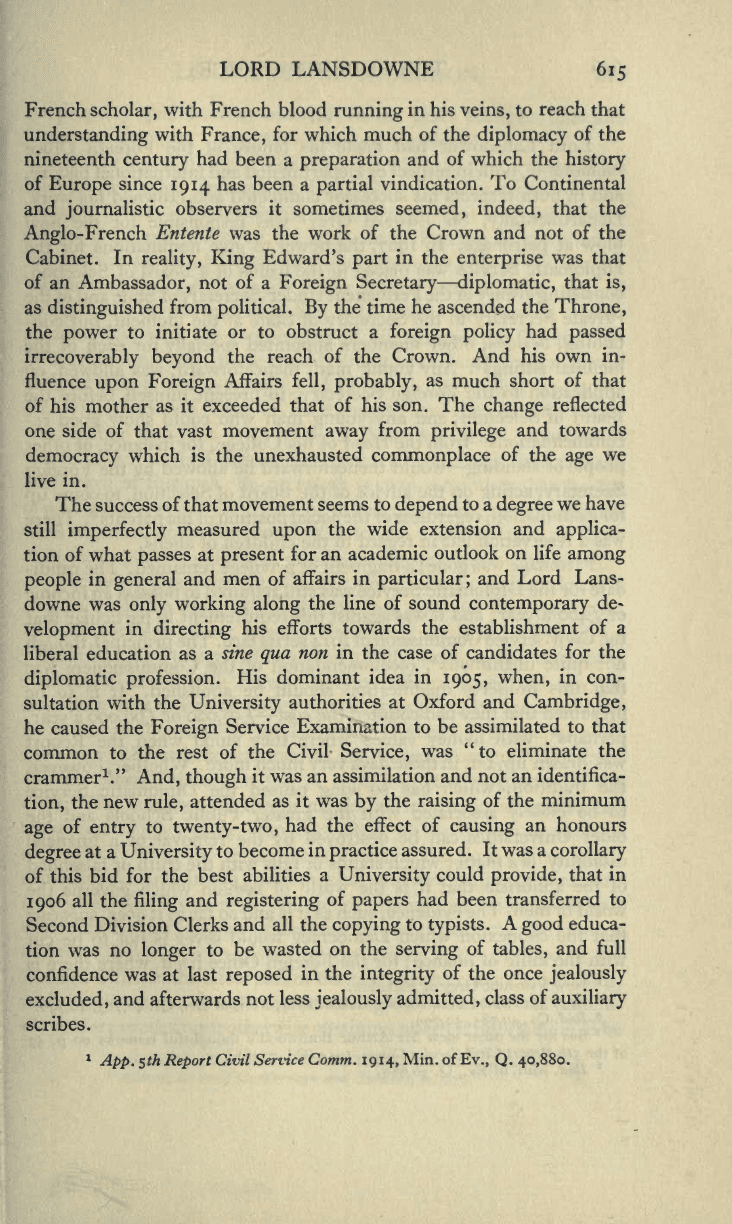
LORD
LANSDOWNE
615
French
scholar,
with French
blood
running
in his
veins,
to
reach
that
understanding
with
France,
for
which
much
of
the
diplomacy
of
the
nineteenth
century
had
been
a
preparation
and
of
which
the
history
of
Europe
since
1914
has
been
a
partial
vindication.
To
Continental
and
journalistic
observers
it sometimes
seemed,
indeed,
that
the
Anglo-French
Entente
was
the
work
of
the
Crown
and
not
of
the
Cabinet.
In
reality, King
Edward's
part
in
the
enterprise
was
that
of
an
Ambassador,
not
of
a
Foreign
Secretary
—
diplomatic,
that
is,
as
distinguished
from
political.
By
the time
he
ascended
the
Throne,
the
power
to
initiate
or
to obstruct a
foreign
policy
had
passed
irrecoverably beyond
the reach
of
the
Crown.
And his own
in-
fluence
upon Foreign
Affairs
fell,
probably,
as
much short
of
that
of
his
mother
as
it exceeded
that
of
his
son. The
change
reflected
one side
of
that
vast
movement
away
from
privilege
and
towards
democracy
which
is
the
unexhausted
commonplace
of
the
age
we
live
in.
The
success
of
that
movement seems to
depend
to
a
degree
we have
still
imperfectly
measured
upon
the
wide
extension
and
applica-
tion
of
what
passes
at
present
for
an academic
outlook
on
life
among
people
in
general
and men of
affairs
in
particular
;
and Lord
Lans-
downe was
only
working
along
the line
of
sound
contemporary
de-
velopment
in
directing
his
efforts
towards the establishment
of
a
liberal education
as a
sine
qua
non in
the case of candidates
for
the
diplomatic profession.
His dominant idea
in
1905,
when,
in con-
sultation
with the
University
authorities at Oxford and
Cambridge,
he caused
the
Foreign
Service
Examination
to be assimilated
to that
common to
the rest of
the
Civil
Service,
was
"to
eliminate
the
crammer
1
."
And,
though
it was
an assimilation and
not an identifica-
tion,
the
new
rule,
attended
as
it
was
by
the
raising
of the
minimum
age
of
entry
to
twenty-
two,
had
the effect
of
causing
an honours
degree
at
a
University
to become
in
practice
assured. It
was a
corollary
of
this
bid for
the
best
abilities
a
University
could
provide,
that in
1906
all the
filing
and
registering
of
papers
had
been
transferred
to
Second Division
Clerks
and
all
the
copying
to
typists.
A
good
educa-
tion
was
no
longer
to
be
wasted
on the
serving
of
tables,
and
full
confidence
was at
last
reposed
in the
integrity
of
the once
jealously
excluded,
and
afterwards
not
less
jealously
admitted,
class
of
auxiliary
scribes.
1
App.
sth
Report
Civil Service
Comm.
1914,
Min. of
Ev.,
Q.
40,880.
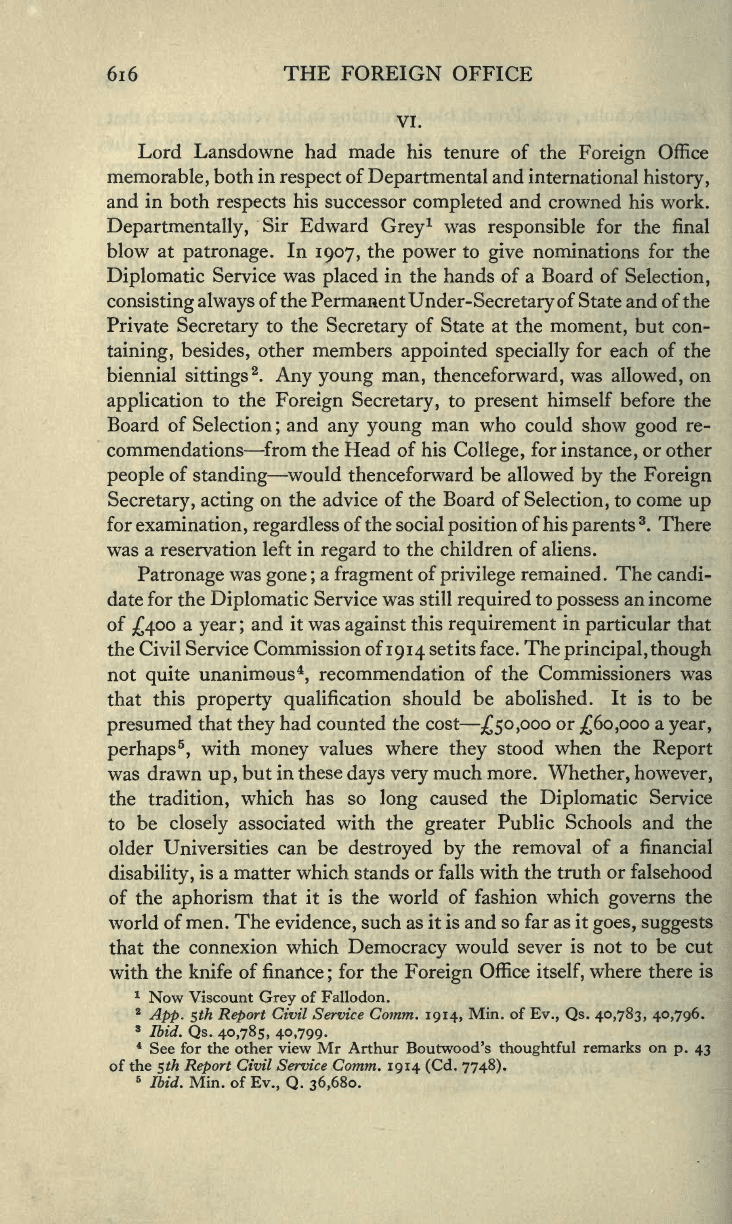
616
THE FOREIGN
OFFICE
VI.
Lord
Lansdowne had
made his
tenure
of
the
Foreign
Office
memorable,
both
in
respect
of
Departmental
and
international
history,
and in both
respects
his
successor
completed
and
crowned his work.
Departmentally,
Sir
Edward
Grey
1
was
responsible
for
the
final
blow
at
patronage.
In
1907,
the
power
to
give
nominations
for
the
Diplomatic
Service
was
placed
in
the
hands of a Board of
Selection,
consisting
always
of
the
Permanent
Under-
Secretary
of
State and of the
Private
Secretary
to
the
Secretary
of
State at
the
moment,
but con-
taining,
besides,
other members
appointed
specially
for each of
the
biennial
sittings
2
.
Any
young
man,
thenceforward,
was
allowed,
on
application
to the
Foreign
Secretary,
to
present
himself
before the
Board of
Selection
;
and
any
young
man
who
could
show
good
re-
commendations
—
from
the Head
of his
College,
for
instance,
or other
people
of
standing
—
would
thenceforward
be
allowed
by
the
Foreign
Secretary, acting
on the
advice
of
the
Board
of
Selection,
to come
up
for
examination,
regardless
of
the social
position
of
his
parents
3
. There
was a reservation
left
in
regard
to the children
of
aliens.
Patronage
was
gone
;
a
fragment
of
privilege
remained. The
candi-
date
for
the
Diplomatic
Service
was
still
required
to
possess
an income
of
£400
a
year
;
and it was
against
this
requirement
in
particular
that
the Civil Service
Commission
of
1914
set
its face.
The
principal,
though
not
quite
unanimous
4
,
recommendation
of
the
Commissioners was
that this
property
qualification
should
be abolished. It is to be
presumed
that
they
had
counted
the
cost
—
£50,000
or
£60,000
a
year,
perhaps
5
,
with
money
values
where
they
stood when the
Report
was
drawn
up,
but
in
these
days
very
much more.
Whether,
however,
the
tradition,
which
has
so
long
caused
the
Diplomatic
Service
to
be
closely
associated
with
the
greater
Public
Schools and the
older Universities can
be
destroyed
by
the
removal
of a financial
disability,
is
a matter
which stands
or
falls
with the
truth
or
falsehood
of
the
aphorism
that
it
is
the
world
of
fashion
which
governs
the
world
of men. The
evidence,
such
as it
is
and
so far as it
goes, suggests
that
the
connexion
which
Democracy
would sever
is
not to
be
cut
with the
knife
of
finance
;
for
the
Foreign
Office
itself,
where there
is
x
Now Viscount
Grey
of Fallodon.
2
App.
sth Report
Civil Service Comm.
1914,
Min.
of
Ev.,
Qs.
40,783,
40,796.
3
Ibid.
Qs.
40,785, 40,799.
4
See
for the other view Mr Arthur Boutwood's
thoughtful
remarks
on
p. 43
of
the
$th Report
Civil Service
Comm.
19 14 (Cd.
7748).
5
Ibid. Min.
of
Ev.,
Q.
36,680.
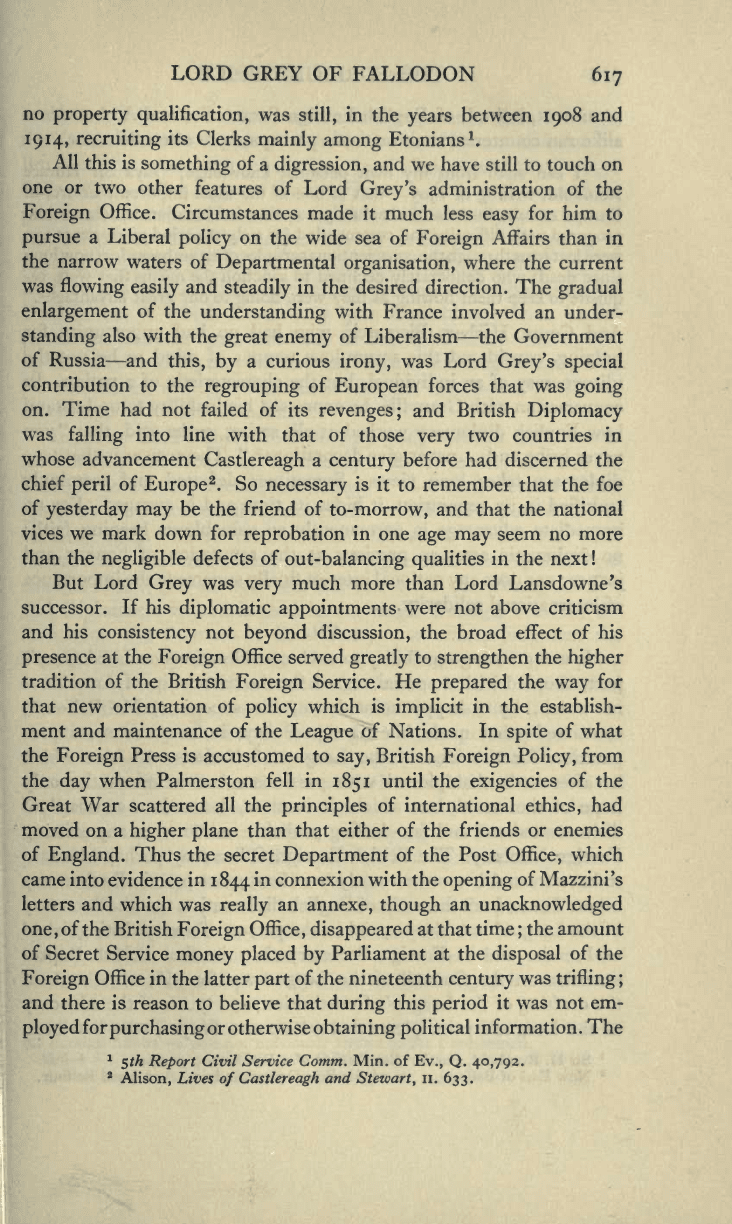
LORD
GREY
OF
FALLODON
617
no
property
qualification,
was
still,
in
the
years
between
1908
and
1914,
recruiting
its
Clerks
mainly
among
Etonians
1
.
All
this is
something
of
a
digression,
and
we
have still to touch
on
one or
two
other
features of
Lord
Grey's
administration
of the
Foreign
Office.
Circumstances
made
it much less
easy
for him to
pursue
a
Liberal
policy
on
the wide
sea
of
Foreign
Affairs
than
in
the
narrow
waters of
Departmental
organisation,
where the
current
was
flowing
easily
and
steadily
in
the desired
direction. The
gradual
enlargement
of
the
understanding
with
France
involved
an
under-
standing
also with
the
great enemy
of
Liberalism
—
the Government
of
Russia
—
and
this,
by
a
curious
irony,
was Lord
Grey's
special
contribution
to
the
regrouping
of
European
forces that was
going
on. Time
had not
failed
of
its
revenges;
and British
Diplomacy
was
falling
into line
with that
of
those
very
two countries
in
whose
advancement
Castlereagh
a
century
before
had
discerned
the
chief
peril
of
Europe
2
. So
necessary
is
it
to
remember
that
the
foe
of
yesterday may
be
the friend
of
to-morrow,
and
that the
national
vices we
mark down for
reprobation
in
one
age
may
seem
no more
than the
negligible
defects
of
out-balancing qualities
in
the next
!
But
Lord
Grey
was
very
much
more
than
Lord Lansdowne's
successor. If
his
diplomatic
appointments
were not above criticism
and his
consistency
not
beyond
discussion,
the
broad
effect
of
his
presence
at the
Foreign
Office served
greatly
to
strengthen
the
higher
tradition
of
the British
Foreign
Service. He
prepared
the
way
for
that
new orientation
of
policy
which
is
implicit
in the establish-
ment and
maintenance
of
the
League
of Nations.
In
spite
of
what
the
Foreign
Press is
accustomed to
say,
British
Foreign Policy,
from
the
day
when
Palmerston
fell
in
1851
until the
exigencies
of the
Great
War
scattered
all the
principles
of
international
ethics,
had
moved on
a
higher plane
than that
either
of
the
friends or enemies
of
England.
Thus
the
secret
Department
of
the Post
Office,
which
came
into evidence
in
1844
in
connexion with the
opening
of
Mazzini's
letters and
which was
really
an
annexe,
though
an
unacknowledged
one,
of
the
British
Foreign
Office,
disappeared
at
that time
;
the
amount
of
Secret
Service
money
placed
by
Parliament at
the
disposal
of
the
Foreign
Office in
the
latter
part
of
the nineteenth
century
was
trifling
;
and
there
is
reason
to believe
that
during
this
period
it was
not
em-
ployed
for
purchasing
or
otherwise
obtaining political
information.
The
1
5th
Report
Civil Service
Comm.
Min. of
Ev.,
Q.
40,792.
2
Alison,
Lives
of
Castlereagh
and
Stewart,
n.
633.
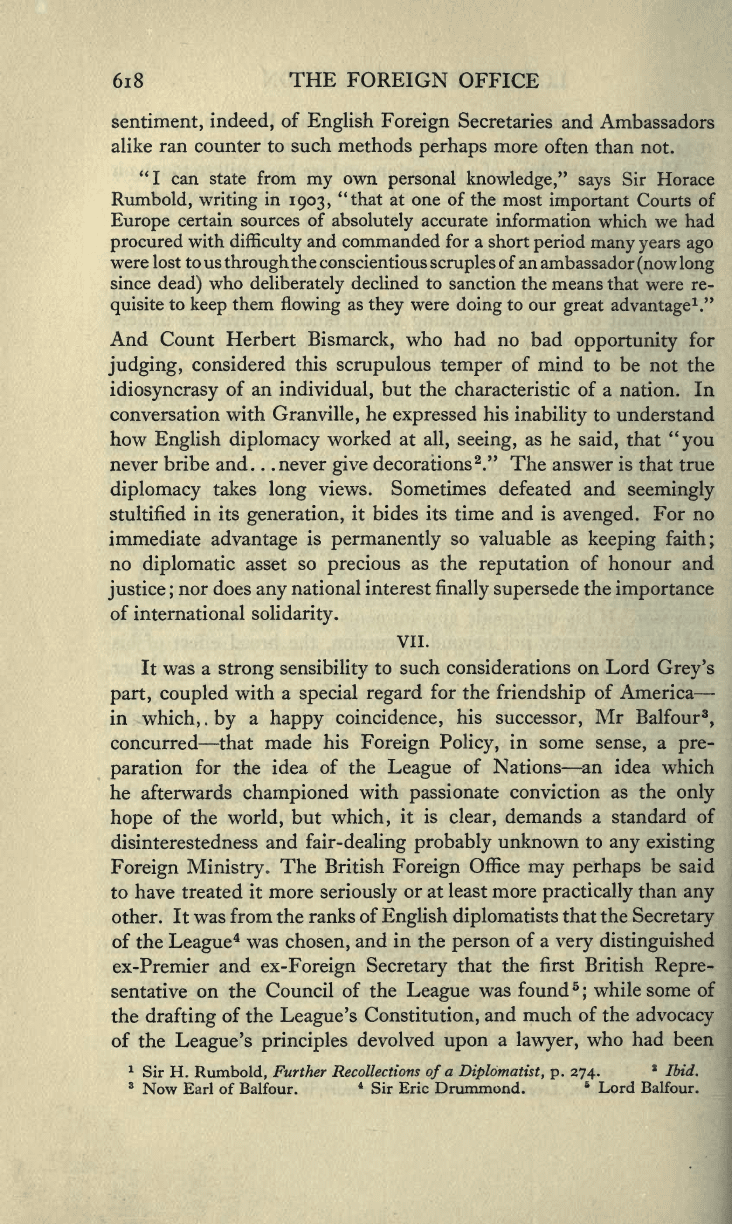
618
THE
FOREIGN
OFFICE
sentiment,
indeed,
of
English Foreign
Secretaries
and Ambassadors
alike
ran
counter to
such
methods
perhaps
more
often than
not.
"I can state from
my
own
personal
knowledge,"
says
Sir
Horace
Rumbold,
writing
in
1903,
"that
at one of
the most
important
Courts
of
Europe
certain
sources of
absolutely
accurate
information
which we
had
procured
with
difficulty
and commanded
for a
short
period
many
years
ago
were lost to
us
through
the
conscientious
scruples
of an
ambassador
(now
long
since
dead)
who
deliberately
declined to
sanction
the means
that
were
re-
quisite
to
keep
them
flowing
as
they
were
doing
to
our
great
advantage
1
."
And
Count
Herbert
Bismarck,
who had no
bad
opportunity
for
judging,
considered this
scrupulous
temper
of
mind
to be
not the
idiosyncrasy
of
an
individual,
but the
characteristic
of
a
nation.
In
conversation with
Granville,
he
expressed
his
inability
to understand
how
English
diplomacy
worked
at
all,
seeing,
as he
said,
that
"you
never bribe
and. . .never
give
decorations
2
."
The answer
is
that true
diplomacy
takes
long
views.
Sometimes defeated and
seemingly
stultified
in
its
generation,
it bides its time and is
avenged.
For
no
immediate
advantage
is
permanently
so
valuable
as
keeping
faith;
no
diplomatic
asset
so
precious
as
the
reputation
of
honour and
justice
;
nor does
any
national interest
finally supersede
the
importance
of
international
solidarity.
VII.
It
was a
strong
sensibility
to
such
considerations on
Lord
Grey's
part, coupled
with
a
special regard
for
the
friendship
of
America
—
in
which,
.by
a
happy
coincidence,
his
successor,
Mr
Balfour
3
,
concurred
—
that
made
his
Foreign
Policy,
in some
sense,
a
pre-
paration
for
the
idea
of
the
League
of
Nations
—
an idea which
he
afterwards
championed
with
passionate
conviction
as
the
only
hope
of
the
world,
but
which,
it
is
clear,
demands a standard
of
disinterestedness
and
fair-dealing probably
unknown
to
any existing
Foreign
Ministry.
The
British
Foreign
Office
may
perhaps
be said
to
have treated it
more
seriously
or at least more
practically
than
any
other.
It
was
from
the
ranks of
English
diplomatists
that the
Secretary
of
the
League
4
was
chosen,
and
in
the
person
of a
very distinguished
ex-Premier
and
ex-Foreign
Secretary
that the
first
British
Repre-
sentative
on
the
Council of
the
League
was
found
5
;
while some of
the
drafting
of
the
League's
Constitution,
and much
of
the
advocacy
of
the
League's
principles
devolved
upon
a
lawyer,
who
had
been
1
Sir H.
Rumbold,
Further Recollections
of
a
Diplomatist, p.
274.
*
Ibid.
3
Now
Earl
of Balfour.
4
Sir
Eric
Drummond.
6
Lord
Balfour.
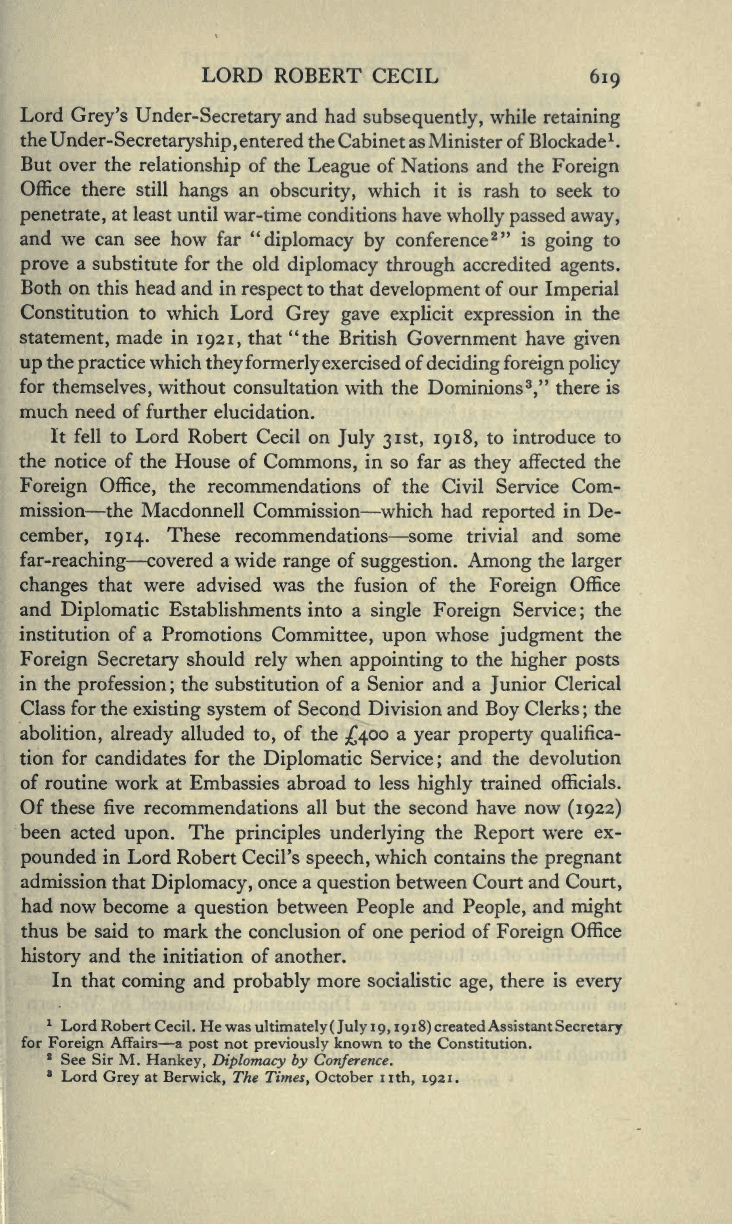
LORD
ROBERT
CECIL
619
Lord
Grey's
Under-Secretary
and
had
subsequently,
while
retaining
the
Under-
Secretaryship,
entered the
Cabinet
as
Minister
of Blockade
1
.
But over the
relationship
of
the
League
of
Nations
and
the
Foreign
Office there
still
hangs
an
obscurity,
which
it
is rash
to
seek to
penetrate,
at
least until
war-time
conditions
have
wholly passed
away,
and
we can
see how far
"diplomacy by
conference
2
"
is
going
to
prove
a
substitute
for
the
old
diplomacy through
accredited
agents.
Both on
this
head and in
respect
to
that
development
of
our
Imperial
Constitution to
which
Lord
Grey gave explicit
expression
in
the
statement,
made in
1921,
that
"the British
Government have
given
up
the
practice
which
they
formerly
exercised
of
deciding
foreign policy
for
themselves,
without
consultation
with the
Dominions
3
,"
there
is
much
need
of
further
elucidation.
It
fell
to
Lord
Robert Cecil
on
July 31st, 19
18,
to
introduce
to
the
notice
of
the House
of
Commons,
in so
far
as
they
affected
the
Foreign
Office,
the
recommendations
of
the
Civil
Service
Com-
mission
—
the Macdonnell Commission
—
which had
reported
in De-
cember,
1
9 14.
These
recommendations
—
some
trivial
and
some
far-reaching
—
covered a
wide
range
of
suggestion. Among
the
larger
changes
that
were advised was
the
fusion of
the
Foreign
Office
and
Diplomatic
Establishments into
a
single Foreign
Service
;
the
institution
of
a
Promotions
Committee,
upon
whose
judgment
the
Foreign Secretary
should
rely
when
appointing
to
the
higher
posts
in
the
profession
;
the substitution
of a Senior and
a
Junior
Clerical
Class
for
the
existing system
of
Second Division and
Boy
Clerks
;
the
abolition,
already
alluded
to,
of
the
£400
a
year property qualifica-
tion
for
candidates for
the
Diplomatic
Service;
and
the
devolution
of
routine work
at
Embassies abroad
to
less
highly
trained
officials.
Of
these five
recommendations
all
but
the
second have
now
(1922)
been
acted
upon.
The
principles
underlying
the
Report
were
ex-
pounded
in
Lord
Robert
Cecil's
speech,
which
contains
the
pregnant
admission
that
Diplomacy,
once
a
question
between
Court
and
Court,
had
now
become a
question
between
People
and
People,
and
might
thus be said
to mark
the
conclusion
of
one
period
of
Foreign
Office
history
and
the
initiation
of
another.
In
that
coming
and
probably
more socialistic
age,
there
is
every
1
Lord
Robert
Cecil. He
was
ultimately (July 19,1918)
created Assistant
Secretary
for
Foreign
Affairs
—
a
post
not
previously
known
to the Constitution.
8
See Sir
M.
Hankey,
Diplomacy by
Conference.
8
Lord
Grey
at
Berwick,
The
Times,
October
nth,
192
1.
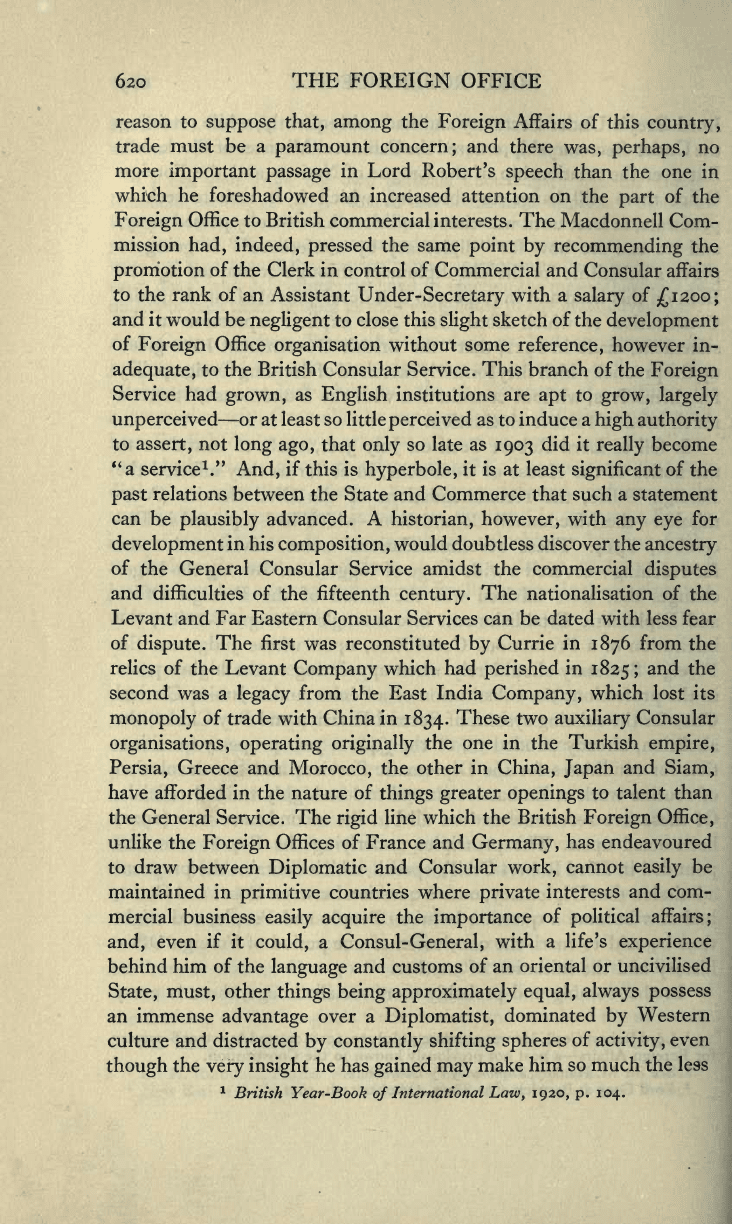
620
THE
FOREIGN
OFFICE
reason
to
suppose
that,
among
the
Foreign
Affairs of
this
country,
trade
must be
a
paramount
concern;
and
there
was,
perhaps,
no
more
important
passage
in Lord
Robert's
speech
than
the
one in
which he
foreshadowed
an increased
attention on
the
part
of
the
Foreign
Office to British commercial
interests.
The
Macdonnell Com-
mission
had,
indeed,
pressed
the same
point
by
recommending
the
promotion
of
the
Clerk
in
control
of
Commercial and
Consular
affairs
to
the
rank
of an
Assistant
Under-Secretary
with a
salary
of
£1200;
and
it would be
negligent
to
close this
slight
sketch of
the
development
of
Foreign
Office
organisation
without
some
reference,
however
in-
adequate,
to the British
Consular Service.
This
branch of
the
Foreign
Service had
grown,
as
English
institutions
are
apt
to
grow, largely
unperceived
—
or
at least
so
little
perceived
as
to induce
a
high authority
to
assert,
not
long ago,
that
only
so
late
as
1903
did
it
really
become
"a
service
1
."
And,
if
this
is
hyperbole,
it
is
at least
significant
of
the
past
relations
between the State
and Commerce
that
such a
statement
can
be
plausibly
advanced. A
historian, however,
with
any
eye
for
development
in
his
composition,
would doubtless discover
the
ancestry
of
the General
Consular
Service amidst the
commercial
disputes
and
difficulties
of
the fifteenth
century.
The nationalisation
of
the
Levant
and Far
Eastern
Consular Services can be
dated with
less
fear
of
dispute.
The
first was reconstituted
by
Currie
in
1876
from
the
relics of
the Levant
Company
which
had
perished
in
1825;
ano
^
tne
second
was a
legacy
from
the
East
India
Company,
which lost
its
monopoly
of
trade with
China
in
1834.
These
two
auxiliary
Consular
organisations,
operating
originally
the
one in
the
Turkish
empire,
Persia,
Greece
and
Morocco,
the
other
in
China,
Japan
and
Siam,
have
afforded in the
nature
of
things greater
openings
to talent than
the General
Service. The
rigid
line
which the British
Foreign
Office,
unlike
the
Foreign
Offices
of
France
and
Germany,
has endeavoured
to draw
between
Diplomatic
and
Consular
work,
cannot
easily
be
maintained
in
primitive
countries where
private
interests
and
com-
mercial business
easily
acquire
the
importance
of
political
affairs;
and,
even
if
it
could,
a Consul-
General,
with
a life's
experience
behind him of
the
language
and customs
of an oriental
or uncivilised
State, must,
other
things being
approximately
equal,
always
possess
an immense
advantage
over a
Diplomatist,
dominated
by
Western
culture
and
distracted
by
constantly
shifting
spheres
of
activity,
even
though
the
very
insight
he
has
gained
may
make
him so much the
less
1
British
Year-Book
of
International
Law, 1920,
p. 104.
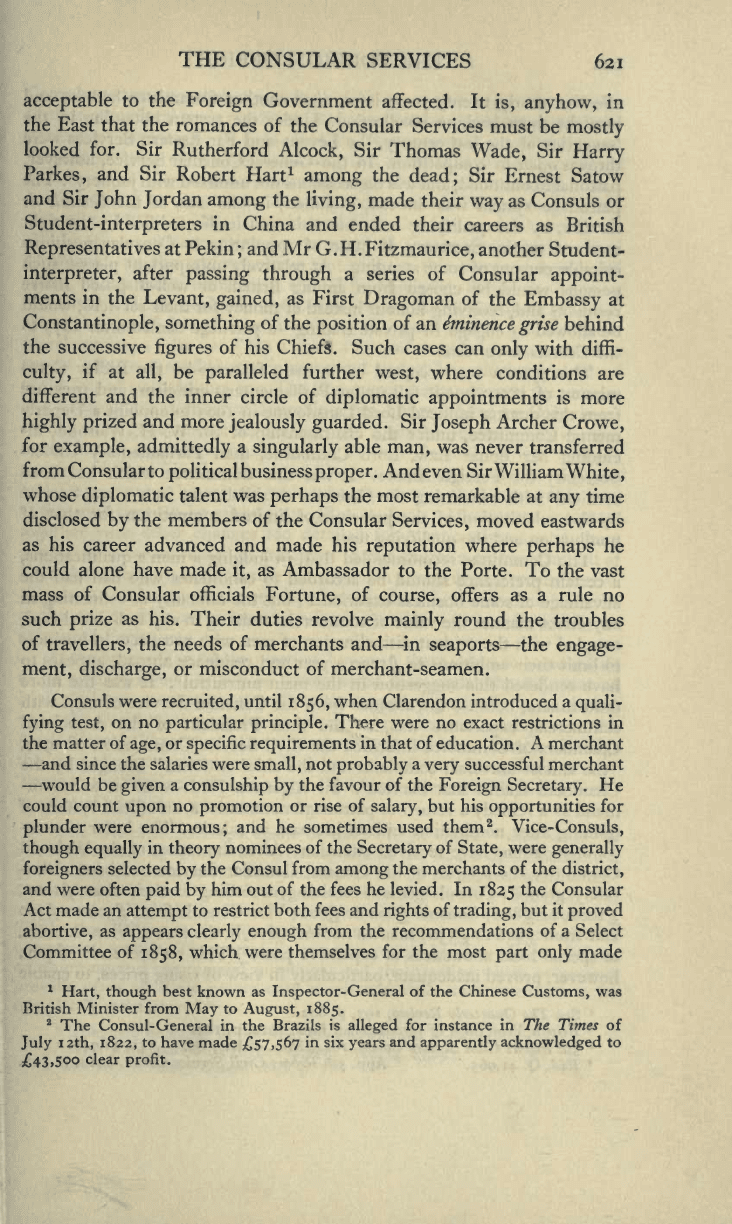
THE
CONSULAR
SERVICES
621
acceptable
to
the
Foreign
Government
affected. It
is,
anyhow,
in
the East that the
romances
of
the
Consular
Services
must
be
mostly
looked
for. Sir
Rutherford
Alcock,
Sir
Thomas
Wade,
Sir
Harry
Parkes,
and Sir
Robert
Hart
1
among
the
dead;
Sir
Ernest Satow
and
Sir
John
Jordan
among
the
living,
made their
way
as
Consuls or
Student-interpreters
in
China
and
ended
their careers as
British
Representatives
at
Pekin
;
and Mr
G.H.Fitzmaurice,
another
Student-
interpreter,
after
passing
through
a series of
Consular
appoint-
ments
in
the
Levant,
gained,
as
First
Dragoman
of
the
Embassy
at
Constantinople,
something
of
the
position
of
an
Eminence
grise
behind
the
successive
figures
of
his
Chiefs. Such
cases can
only
with
diffi-
culty,
if
at
all,
be
paralleled
further
west,
where
conditions are
different
and
the
inner
circle of
diplomatic
appointments
is
more
highly prized
and more
jealously
guarded.
Sir
Joseph
Archer
Crowe,
for
example,
admittedly
a
singularly
able
man,
was
never
transferred
from
Consular
to
political
business
proper.
And
even
Sir
William
White,
whose
diplomatic
talent was
perhaps
the most
remarkable at
any
time
disclosed
by
the
members
of
the
Consular
Services,
moved
eastwards
as his
career advanced and
made
his
reputation
where
perhaps
he
could
alone have made
it,
as
Ambassador
to the Porte.
To
the vast
mass of
Consular officials
Fortune,
of
course,
offers
as
a
rule no
such
prize
as
his.
Their
duties revolve
mainly
round
the
troubles
of
travellers,
the needs
of
merchants
and
—
in
seaports
—
the
engage-
ment,
discharge,
or
misconduct
of
merchant-seamen.
Consuls
were
recruited,
until
1856,
when Clarendon
introduced
a
quali-
fying
test,
on
no
particular principle.
There
were no exact
restrictions in
the
matter of
age,
or
specific requirements
in that of
education.
A
merchant
—
and
since the salaries were
small,
not
probably
a
very
successful merchant
—
would
be
given
a
consulship by
the favour
of
the
Foreign Secretary.
He
could count
upon
no
promotion
or rise of
salary,
but
his
opportunities
for
plunder
were
enormous;
and he sometimes used them
2
.
Vice-Consuls,
though equally
in
theory
nominees of
the
Secretary
of
State,
were
generally
foreigners
selected
by
the
Consul
from
among
the merchants
of
the
district,
and were
often
paid by
him out
of
the fees
he levied.
In
1825
the
Consular
Act
made an
attempt
to
restrict both
fees and
rights
of
trading,
but
it
proved
abortive,
as
appears clearly
enough
from
the
recommendations
of a
Select
Committee of
1858,
which were
themselves
for
the
most
part
only
made
1
Hart,
though
best known as
Inspector-
General of
the
Chinese
Customs,
was
British Minister
from
May
to
August, 1885.
2
The
Consul-General in
the Brazils
is
alleged
for instance
in The Times of
July
12th, 1822,
to
have made
£57,567
in
six
years
and
apparently acknowledged
to
£43,500
clear
profit.
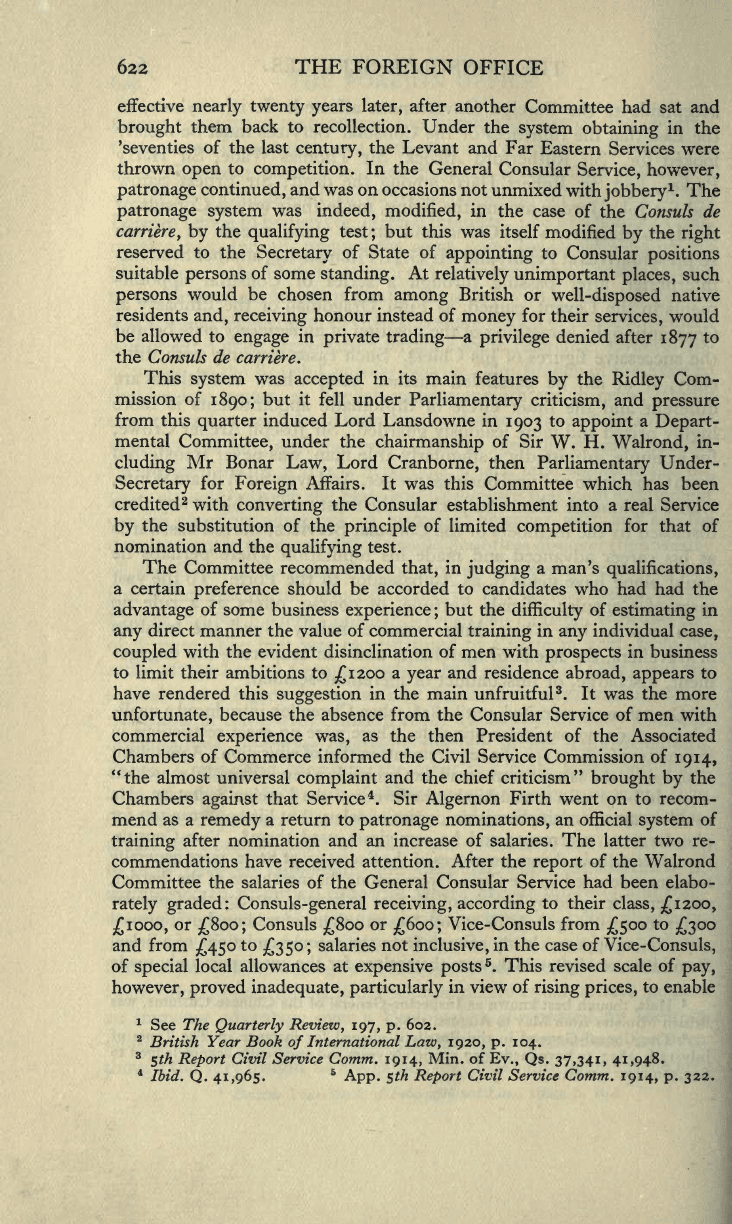
622
THE
FOREIGN
OFFICE
effective
nearly twenty years
later,
after
another
Committee
had
sat and
brought
them back
to
recollection.
Under
the
system
obtaining
in
the
'seventies of the
last
century,
the Levant
and Far
Eastern
Services
were
thrown
open
to
competition.
In the
General
Consular
Service,
however,
patronage
continued,
and was on
occasions not
unmixed
with
jobbery
1
.
The
patronage system
was
indeed,
modified,
in
the case
of
the Consuls
de
carriere,
by
the
qualifying
test
;
but
this was itself
modified
by
the
right
reserved to
the
Secretary
of State of
appointing
to
Consular
positions
suitable
persons
of some
standing.
At
relatively
unimportant
places,
such
persons
would
be
chosen from
among
British
or
well-disposed
native
residents
and,
receiving
honour instead of
money
for
their
services,
would
be
allowed to
engage
in
private trading
—
a
privilege
denied after
1877
to
the
Consuls de
carriere.
This
system
was
accepted
in its main
features
by
the
Ridley
Com-
mission
of
1890;
but
it
fell under
Parliamentary
criticism,
and
pressure
from
this
quarter
induced Lord Lansdowne in
1903
to
appoint
a
Depart-
mental
Committee,
under the
chairmanship
of Sir
W. H.
Walrond,
in-
cluding
Mr
Bonar
Law,
Lord
Cranborne,
then
Parliamentary
Under-
Secretary
for
Foreign
Affairs. It was
this
Committee
which
has
been
credited
2
with
converting
the Consular
establishment
into a real Service
by
the substitution of
the
principle
of limited
competition
for
that of
nomination
and
the
qualifying
test.
The Committee
recommended
that,
in
judging
a man's
qualifications,
a
certain
preference
should
be accorded to
candidates who
had had
the
advantage
of some business
experience
;
but
the
difficulty
of
estimating
in
any
direct
manner the value of commercial
training
in
any
individual
case,
coupled
with the evident disinclination of men
with
prospects
in
business
to limit
their ambitions to
£1200
a
year
and
residence
abroad,
appears
to
have
rendered
this
suggestion
in the main
unfruitful
3
.
It was
the more
unfortunate,
because the absence from the
Consular
Service of men
with
commercial
experience
was,
as
the then President
of
the Associated
Chambers of
Commerce
informed the
Civil
Service Commission of
1914,
"the almost universal
complaint
and
the
chief
criticism"
brought
by
the
Chambers
against
that
Service
4
.
Sir
Algernon
Firth went
on to recom-
mend as a
remedy
a return to
patronage
nominations,
an official
system
of
training
after nomination and an increase
of
salaries.
The latter two re-
commendations have received
attention.
After
the
report
of
the
Walrond
Committee
the
salaries
of
the General Consular
Service had been elabo-
rately
graded:
Consuls-general receiving,
according
to
their
class,
£1200,
£1000,
or
£800;
Consuls
£800
or
£600;
Vice-Consuls
from
£500
to
£300
and from
£450
to
£350
;
salaries
not
inclusive,
in
the case
of
Vice-Consuls,
of
special
local allowances
at
expensive posts
5
.
This
revised scale
of
pay,
however,
proved
inadequate,
particularly
in view of
rising
prices,
to enable
1
See The
Quarterly
Review,
197,
p.
602.
2
British Year
Book
of
International
Law,
1920, p.
104.
3
5th
Report
Civil
Service Comm.
1914,
Min. of
Ev., Qs.
37,341, 41,948.
4
Ibid.
Q.
41,965.
6
App. $th Report
Civil
Service Comm.
1914, p. 322.

THE
CONSULAR SERVICES
623
Consuls
to
keep up
such
a standard of
living
as
was
required
to
enable
them
to
study
local trade
conditions and to mix
in
leading
mercantile
circles
to the
best
advantage.
In
1912,
another
Departmental
Committee,
under
the
chairmanship
of Sir
Algernon
Law,
then at
the head
of
the
Commercial
and
Consular
Department
of
the
Foreign
Office,
recommended
that
a
year's
training
at some
large
shipping-centre
should be
instituted
in the
case of
probationer
Vice-Consuls,
and
that
Consuls in
the lower
grade
should
receive
salaries
rising by
increases
of
£20
to
£700,
besides
local
allowances,
on
the
understanding
that men
in this
category,
being
still
young
and
possibly
unmarried,
should be
regularly
allotted to
the more
unhealthy
and
less desirable
posts.
On
passing
out of
the
lower
grade,
at
about the
age
of
forty-five,
and
entering
the
grade
carrying,
after fifteen
years'
service,
a
salary
of
£800
a
year,
a
Consul
would thus be
entitled to
expect
a
more
agreeable
appointment
and
to feel
himself
finally
relieved
of
the fear of
an
insanitary
one. The Committee further advised
the transfer
of a considerable number
of
desirable
posts,
hitherto filled
by
Consuls re-
ceiving
only
£600,
to the
higher
list;
and
a
similar
recommendation was
made
in
the case
of
posts
allotted to Consuls-
General,
so
that
a
larger
number
of these functionaries
would be stationed
where
salaries of
£1200
and
£1000
were
to be
earned,
whilst the
pay
of
even the
lowest
grade
was,
at the
same
time,
to be
raised from
£800
to
£900.
All
this
was
accepted,
together
with
other
changes
too detailed for
mention here
1
,
and
there
appears
to be some
reason to
anticipate
in
due
course
a
higher
standard
of
Consular
efficiency,
even
though
Sir
Algernon
Law's drastic
recommenda-
tion,
based
on
large experience,
that Consuls
should be retired on
pensions
at the
age
of
fifty,
or at least
fifty-five
2
,
is
unlikely
to
be followed
by
an
exhausted
Exchequer.
At the heart
of the
whole
question,
however,
there seems to
some minds
to lie
a wider issue.
It will be remembered
that,
under
the
influence of
Mallet's
large
conception
of a
Free-Trade
policy gradually
to
be forced
upon
the world
by
the
conclusion of commercial
treaties,
analogous
to the
Anglo-French
Treaty
of i860
and
the
Anglo-
Austrian
Treaty
of
1865,
the
care
of
overseas
commerce
had been transferred from
the
Board
of
Trade to the
Foreign
Office
in
1872.
Of
this
arrangement
the
Ridley
Com-
mission
of
1890
expressed approval.
"The Commercial
Department
of the
Foreign
Office,"
they
said,
"is
one for
negotiating
commercial treaties
;
that
of
the
Board of Trade
for
the
publication
of information.
The
Foreign
Office
by
its
reports
from Secre-
taries of
Legation
and Consuls
supplies
the Board of Trade with a
good
deal
of the
material which the latter
works
up
for
publication,
and the Board of
Trade
gives
advice to the
Foreign
Office
with
regard
to the
negotiation
of
commercial treaties. There are
daily
communications between the two Offices
on
shipping
and
commercial
questions,
and the
practice
which at
present
prevails upon
all
these
points
only
requires
a
little more extension
to be
completely
satisfactory
3
."
1
They
will be
found
in the
App.
5th Report
Civil Service Comm.
19
14.
8
App.
5th Report
Civil Service
Comm.
19 14,
Q.
43,097.
3
\th Report Ridley
Comm.
1890,
p.
7.
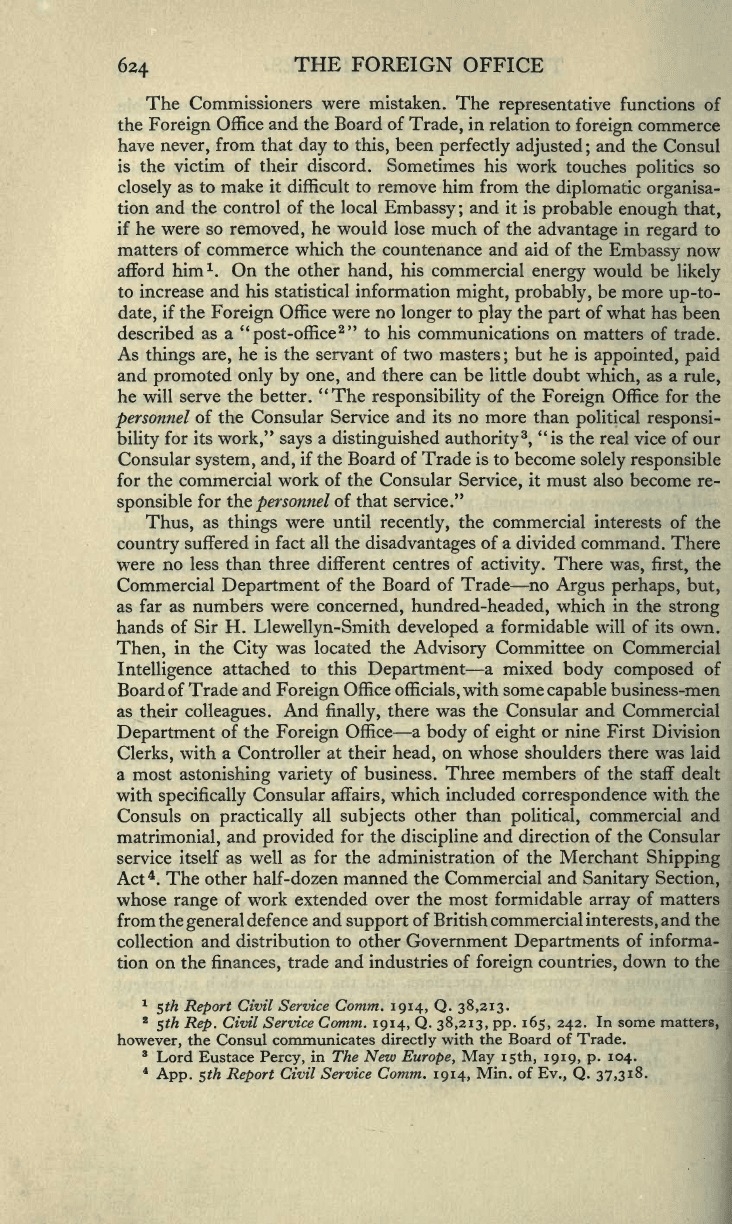
624
THE
FOREIGN
OFFICE
The
Commissioners
were
mistaken. The
representative
functions
of
the
Foreign
Office
and
the Board
of
Trade,
in
relation to
foreign
commerce
have
never,
from that
day
to
this,
been
perfectly
adjusted
;
and
the
Consul
is
the victim
of their discord. Sometimes
his
work
touches
politics
so
closely
as to make
it difficult to
remove him
from
the
diplomatic
organisa-
tion
and the
control of the local
Embassy;
and
it
is
probable
enough
that,
if
he
were
so
removed,
he would lose
much
of
the
advantage
in
regard
to
matters of commerce which the countenance and aid of
the
Embassy
now
afford
him
1
.
On the
other
hand,
his
commercial
energy
would
be
likely
to increase
and
his
statistical information
might,
probably,
be
more
up-to-
date,
if
the
Foreign
Office
were no
longer
to
play
the
part
of
what has been
described
as a
"post-office
2
"
to his
communications on
matters
of
trade.
As
things
are,
he
is
the servant
of
two masters
;
but he is
appointed,
paid
and
promoted
only by
one,
and
there can
be
little
doubt
which,
as a
rule,
he will
serve the better.
"The
responsibility
of
the
Foreign
Office for
the
personnel
of
the Consular
Service and its no more
than
political
responsi-
bility
for its
work,"
says
a
distinguished authority
3
,
"is
the
real
vice
of
our
Consular
system,
and,
if the Board
of Trade is to
become
solely responsible
for the commercial
work
of
the Consular
Service,
it must
also
become
re-
sponsible
for the
personnel
of
that
service."
Thus,
as
things
were
until
recently,
the commercial
interests
of
the
country
suffered
in fact all the
disadvantages
of
a
divided
command. There
were
no less than
three different centres of
activity.
There
was,
first,
the
Commercial
Department
of
the
Board
of
Trade
—
no
Argus
perhaps,
but,
as
far as numbers were
concerned, hundred-headed,
which
in
the
strong
hands
of Sir H.
Llewellyn-
Smith
developed
a
formidable will of its
own.
Then,
in the
City
was located the
Advisory
Committee on
Commercial
Intelligence
attached
to this
Department
—
a
mixed
body composed
of
Board of Trade
and
Foreign
Office
officials,
with
some
capable
business-men
as
their
colleagues.
And
finally,
there
was
the Consular
and
Commercial
Department
of the
Foreign
Office
—
a
body
of
eight
or nine First
Division
Clerks,
with
a
Controller
at
their
head,
on
whose shoulders there was laid
a
most
astonishing
variety
of
business. Three members
of
the
staff
dealt
with
specifically
Consular
affairs,
which included
correspondence
with
the
Consuls
on
practically
all
subjects
other than
political,
commercial and
matrimonial,
and
provided
for the
discipline
and direction
of
the
Consular
service
itself as well
as for the administration
of
the Merchant
Shipping
Act
4
.
The other half-dozen
manned the Commercial
and
Sanitary
Section,
whose
range
of work extended
over the
most
formidable
array
of matters
from the
general
defence
and
support
of
British
commercial
interests,
and
the
collection
and
distribution
to other Government
Departments
of
informa-
tion on
the
finances,
trade
and
industries
of
foreign
countries,
down to the
1
$th
Report
Civil
Service Comm.
1914,
Q.
38,213.
2
5th Rep.
Civil Service
Comm.
1914,
Q.
38,213,
pp.
165,
242.
In some
matters,
however,
the Consul
communicates
directly
with the Board
of
Trade.
3
Lord Eustace
Percy,
in The
New
Europe, May
15th,
1919, p.
104.
4
App. 5th Report
Civil Service
Comm.
1914,
Min. of
Ev.,
Q.
37,3
18.
